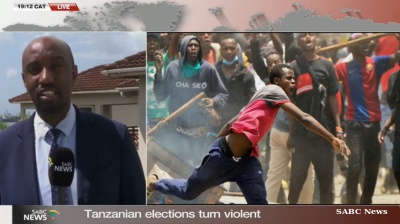Guinea’s military leader General Mamadi Doumbouya has formally submitted his candidacy for next month’s presidential election, four years after leading the September 2021 coup that removed then-President Alpha Condé.
Doumbouya filed his nomination papers at the Supreme Court in Conakry on Monday (November 3), accompanied by military officers. He did not make a public statement during the submission. The election is scheduled for December 28.
A new constitution, approved in a recent referendum, permits junta members to run for office and extends the presidential mandate from five to seven years. Doumbouya had previously pledged that neither he nor any other figure in the transition government would contest elections, a position stated shortly after the coup.
Two major opposition parties, RPG Arc-en-Ciel and the Union des Forces Démocratiques de Guinée (UFDG), have been excluded from participating following legal and administrative decisions. Their respective leaders, Cellou Dalein Diallo and Sidya Touré, are currently abroad and are not expected to appear on the ballot. Other declared candidates include former Prime Minister Lansana Kouyaté and former minister Ousmane Kaba.
Civil society groups have raised concerns regarding electoral competitiveness. Human rights organisations and press advocacy groups have reported restrictions on political assembly, arrests of activists, and temporary media suspensions during the transition period. Authorities say the measures respond to public order considerations.
“General Doumbouya came to power criticising ‘the instrumentalisation of justice [and] the trampling of citizens’ rights’ under Condé. But the general’s government has not calmed the country’s sometimes violent and volatile politics or found a solution to divisions and rivalries in the armed forces,” International Crisis Group expert Franklin Nossiter wrote in an October analysis of the political climate.
“Now, Doumbouya appears to be following in Condé’s footsteps by seeking an electoral mandate after pushing through constitutional changes. […] By repeating Condé’s strategy – remaining in office at all costs and mobilising the power of the state to undermine the opposition and civil society – Guinea’s new leaders run the risk of winding up like him: at the top but with waning legitimacy and facing the threat of a coup from within the still-divided military.”
Relations between Conakry and Ecowas – a fcregional political and economic bloc of West African member states, mandated to promote regional cooperation, economic integration and collective security – have remained strained throughout the transition.
ECOWAS previously imposed targeted sanctions on members of the junta following delays to the agreed electoral timetable. Those sanctions were lifted in early 2024 after updated commitments, but the bloc has continued to call for inclusive participation and safeguards for civil liberties during the electoral period.
Doumbouya is one of several military leaders in West Africa who have assumed power via coups in recent years, alongside ruling juntas in Mali, Niger and Burkina Faso, which in January 2024 announced they would withdraw from Ecowas and have since formed the Alliance of Sahel States (AES).
Guinea’s electoral commission has reported ongoing voter register updates, while observer networks have raised concerns regarding access to identification documents and participation of displaced and diaspora voters.
Preparations for ballot distribution and polling station deployment are underway with technical support from the African Union and United Nations. The new electoral framework also allows two leadership appointments to the electoral authority by presidential decree.
Guinea is one of the world’s largest bauxite producers and has continued to attract foreign investment from Chinese, Russian, Emirati and Anglo-Australian operators. Political stability and regulatory continuity will remain central to timelines for major mining investments, including bauxite expansion projects in Boké and Sangaredi, alongside the proposed development of the Simandou iron ore corridor.
While Mali, Niger and Burkina Faso have deepened defence and political cooperation with Russia since forming the AES, Guinea’s relationship with Moscow has been more calibrated. Doumbouya has maintained active diplomatic and military ties with Russia, including training exchanges and senior-level visits, while also preserving working relationships with China, the EU and the United States. Conakry has sought to avoid a decisive geopolitical alignment, mindful of investor confidence in the mining sector.
News

New members expected to join EU by 2030 as enlargement momentum builds
Top European Commission officials say admitting new member states to the European Union by 2030 is now a “realistic goal”.

Russia floats missile supplies to Maduro as US pressure mounts
A prominent Russian lawmaker has suggested that Moscow could supply Venezuela with advanced weapons systems, including the new Oreshnik ballistic missile, as Caracas desperately seeks military assistance amid the escalating US military build-up.

Russia closing the trap as its forces expand control of Pokrovsk
The stronghold city of Pokrovsk in the heart of the Donbas now risks “becoming a graveyard for Ukraine’s finest,” Euromaidan Press reports as Russian forces expand their control and threaten to encircle hundreds of Ukraine’s best troops.

Czech election winner Babiš signs coalition agreement with SPD and Motorists
ANO and its partners are poised to form the most rightwing cabinet in the country’s history.




